Related Research Articles
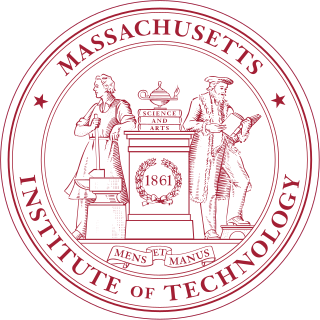
Massachusetts Institute of Technology (MIT) is a private land-grant research university in Cambridge, Massachusetts. Established in 1861, the institute has since played a key role in the development of modern science, engineering, mathematics, and technology, and ranks among the most prestigious academic institutions in the world.
Charles Stark "Doc" Draper was an American scientist and engineer, known as the "father of inertial navigation". He was the founder and director of the Massachusetts Institute of Technology's Instrumentation Laboratory, later renamed the Charles Stark Draper Laboratory, which made the Apollo Moon landings possible through the Apollo Guidance Computer it designed for NASA.
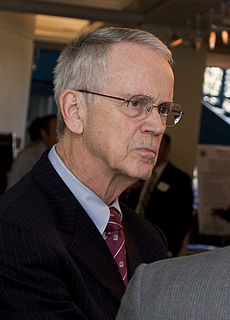
Charles "Chuck" Marstiller Vest was an American educator and engineer. He served as President of the Massachusetts Institute of Technology from October 1990 until December 2004. He succeeded Paul Gray and was succeeded by Susan Hockfield. He served as president of the National Academy of Engineering from 2007 to 2013.
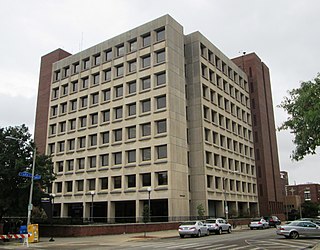
The College of Liberal Arts & Sciences has been central to the University of Illinois Urbana-Champaign for over 100 years. Established in 1913 through the merger of the College of Literature and Arts and the College of Science, the College of LAS now stands as the largest college at the university. The college offers several on-campus undergraduate programs, masters programs, and Ph.D. programs. As of 2020, there are nearly 12,000 undergraduate students and 2,500 graduate students attending the College of Liberal Arts & Sciences.

Robert Samuel Langer, Jr. FREng is an American chemical engineer, scientist, entrepreneur, inventor and one of the twelve Institute Professors at the Massachusetts Institute of Technology.

Henry Way Kendall was an American particle physicist who won the Nobel Prize in Physics in 1990 jointly with Jerome Isaac Friedman and Richard E. Taylor "for their pioneering investigations concerning deep inelastic scattering of electrons on protons and bound neutrons, which have been of essential importance for the development of the quark model in particle physics."

Richard Royce Schrock is an American chemist and Nobel laureate recognized for his contributions to the olefin metathesis reaction used in organic chemistry.

Manson Benedict was an American nuclear engineer and a professor of nuclear engineering at the Massachusetts Institute of Technology (MIT). From 1958 to 1968, he was the chairman of the advisory committee to the U.S. Atomic Energy Commission.

Leo Rafael Reif is a Venezuelan-American electrical engineer, writer and academic administrator. He is the president of the Massachusetts Institute of Technology, succeeding Susan Hockfield on July 2, 2012. Reif previously served as the Institute's provost, as the head of MIT's Department of Electrical Engineering and Computer Science and as the director of the MIT Microsystems Technology Laboratories.

Nancy Hopkins, an American molecular biologist, is the Amgen, Inc. Professor of Biology at the Massachusetts Institute of Technology. She is a member of the National Academy of Sciences, the Institute of Medicine of the National Academy, and the American Academy of Arts and Sciences. She is known for her research identifying genes required for zebrafish development, and for her earlier research on gene expression in the bacterial virus, lambda, and on mouse RNA tumor viruses. She is also known for her work promoting equality of opportunity for women scientists in academia.
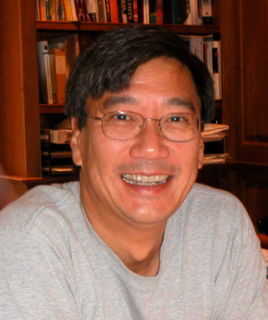
Peter S. Kim is an American scientist. He was president of Merck Research Laboratories (MRL) 2003-2013 and is currently Virginia & D.K. Ludwig Professor of Biochemistry at Stanford University, Institute Scholar at Stanford ChEM-H, and Lead Investigator of the Infectious Disease Initiative at the Chan Zuckerberg Biohub.
Richard K. Lester is an American nuclear engineer, educator, and author. He is the Japan Steel Industry Professor and Associate Provost at the Massachusetts Institute of Technology, where he oversees the international engagements of the Institute. He previously served as Head of the Department of Nuclear Science and Engineering at MIT and he is the founding Director and Faculty Chair of the MIT Industrial Performance Center.

Subra Suresh is an Indian-American biological engineer, materials scientist, and academic administrator. On 1 January 2018, he was inaugurated as the fourth President of Singapore's Nanyang Technological University (NTU), where he is also the inaugural Distinguished University Professor. He was the Vannevar Bush Professor of Engineering at the Massachusetts Institute of Technology (MIT), and Dean of the School of Engineering at MIT from 2007 to 2010 before being appointed as Director of the National Science Foundation (NSF) by Barack Obama, where he served from 2010 to 2013. He was the president of Carnegie Mellon University (CMU) from 2013 to 2017.
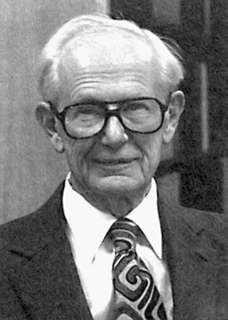
John George Trump was an American electrical engineer, inventor, and physicist. A professor at the Massachusetts Institute of Technology from 1936 to 1973, he was a recipient of the National Medal of Science and a member of the National Academy of Engineering. John Trump was noted for developing rotational radiation therapy. Together with Robert J. Van de Graaff, he developed one of the first million-volt X-ray generators. He was the paternal uncle of former U.S. President Donald Trump.

Ernest Jeffrey Moniz, GCIH is an American nuclear physicist and government official. From May 2013 to January 2017, Moniz served as United States Secretary of Energy in the Obama Administration. Prior to this, he served as the Associate Director for Science in the Office of Science and Technology Policy in the Executive Office of the President of the United States from 1995 to 1997 and was Under Secretary of Energy from 1997 to 2001 during the Clinton Administration.

Paula Therese Hammond is a David H. Koch Professor in Engineering and the Head of the Department of Chemical Engineering at the Massachusetts Institute of Technology (MIT). Her laboratory designs polymers and nanoparticles for drug delivery and energy-related applications including batteries and fuel cells. She is an intramural faculty member of the Koch Institute for Integrative Cancer Research and an Associate Editor of ACS Nano.
Gerbrand Ceder is a Belgian-American scientist who is the Daniel M. Tellep Distinguished Professor of Materials Science and Engineering at University of California, Berkeley. He is notable for his pioneering research in high-throughput computational materials design, and in the development of novel lithium-ion battery technologies. He is co-founder of the Materials Project, an open-source online database of ab initio calculated material properties, which inspired the Materials Genome Initiative by the Obama administration in 2011. He is also the Founder and CTO of Pellion Technologies, which aims to commercialize Magnesium-ion batteries. In 2017 Gerbrand Ceder was elected to the National Academy of Engineering, "For the development of practical computational materials design and its application to the improvement of energy storage technology."

Anantha P. Chandrakasan is the dean of the School of Engineering and Vannevar Bush Professor of Electrical Engineering and Computer Science at Massachusetts Institute of Technology. He also co-chairs the MIT–IBM Watson AI Lab, the MIT- Takeda Program, and the MIT and Accenture Convergence Initiative for Industry and Technology.
Gareth Huw McKinley is Professor of Teaching Innovation in the Department of Mechanical Engineering at Massachusetts Institute of Technology (MIT).
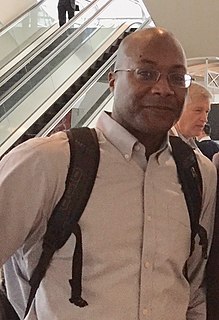
Thomas H. Epps, III is an American chemist and the Thomas & Kipp Gutshall Professor of Chemical & Biomolecular Engineering at the University of Delaware. He has a joint appointment in Materials Science & Engineering, and an affiliated appointment in Biomedical Engineering. He serves as the Director of the Center for Research in Soft Matter & Polymers, the Director of the Center for Hybrid, Active, and Responsive Materials, and the Co-Director of the Center for Plastics Innovations. His research considers the design, synthesis, characterization, and application of nanostructure-containing polymers related to biobased materials, drug delivery, alternative energy (batteries), nanotemplating, and composite-based personal-protective equipment. He is also the co-founder of Lignolix, which is focused on the valorization of biomass waste.
References
- ↑ McKinley, Gareth Huw (1991). Nonlinear dynamics of viscoelastic flows in complex geometries. mit.edu (PhD thesis). Massachusetts Institute of Technology. hdl:1721.1/13921. OCLC 24882667.

- ↑ "Robert Armstrong | MIT Energy Initiative". Energy.mit.edu. 2019-10-21. Retrieved 2019-10-28.CS1 maint: discouraged parameter (link)
- ↑ "Dr. Robert C. Armstrong". NAE Website. Retrieved 2021-01-08.
- ↑ "Robert C. Armstrong". American Academy of Arts & Sciences. Retrieved 2021-01-08.
- ↑ "Robert C. Armstrong". AIChE. Retrieved 9 March 2021.